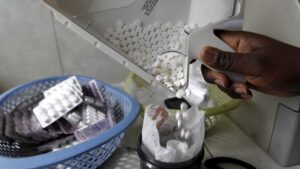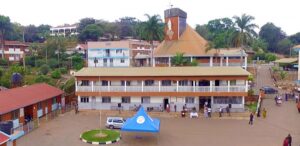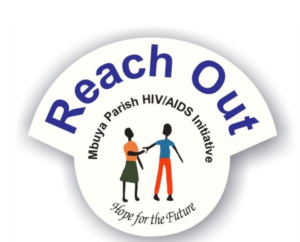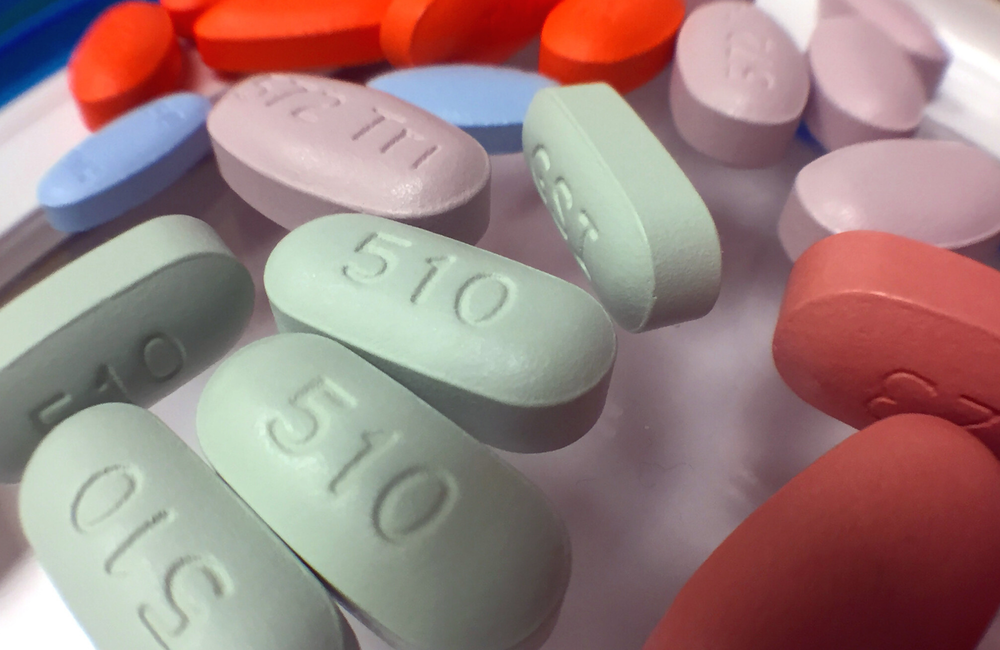TRANSPARENCY: CoST Uganda Commissions 2nd Infrastructure Transparency Index
BY PATRICK JARAMOGI
KAMPALA, Uganda|SHIFTMEDIA| Since its outbreak in Wuhan in China in December last year, the COVID-19 pandemic has caused much uncertainty around the world, including for people living with and affected by HIV in Uganda.
Latest scientific research indicates that COVID-19 has the potential to cause substantial disruptions to health services, due to cases overburdening the health system or response measures limiting usual programmatic activities.
Grace Among who has lived with HIV/AIDs for the last 15 years and has been on drugs is among the 1.4 million Ugandan HIV positive patients who have been inconvenienced by the COVID 19 pandemic.
Despite the scale-up of HIV treatment in Uganda in recent years, people living with HIV do not have access to antiretroviral therapy, which may compromise their immune systems. According to Among, the 40-year-old mother of two who has been receiving drugs from Reach Out Mbuya the lockdown greatly affected access to ARVs and other related HIV/AIDS services.
“Since 2005 I have been accessing my drugs smoothly from Reach Out Mbuya until the lockdown was announced in late March. Accessing the services was made difficult due to lack of transport. Public transport was banned, and the boda boda’s (motorbikes) that we were fond of using were restricted to only carrying luggage,” said Among in an interview.

The resident of Kinawakata in Mbuya, Nakawa Division in Kampala said the issue of curfew also compounded the challenge of accessing drugs. “The staff who used to attend to us had limited hours to work amidst the challenges of transport. This means we hours of attending to us was reduced drastically,” she said.
Among who earns a living by selling fresh vegetables and fruits in her verandah has an appeal to government: “To help those like her (HIV positive persons) with support in form of start-ups to be able to sustain life”
She noted that the pandemic greatly affected their income since most people were no longer working, but locked at home. “The purchasing power went low, people no longer purchase as they did before the lockdown and curfew. I appeal to the government to support us with capital as people living with HIV/AIDS,” she said.
Among’s call is similar to that of UNAIDS that urged Governments to respect the human rights and dignity of people affected by COVID-19. “The experiences learned from the HIV epidemic can be applied to the fight against COVID-19. As in the AIDS response, governments should work with communities to find local solutions,” noted UNAIDS.
UNAIDs has cautioned those people living with HIV, especially those with advanced or poorly controlled HIV disease to pay attention to the prevention measures and recommendations given by health officials.
Though UNAIDS called for having multi-month refills of HIV medicines for those living with HIV, majority who had stock outs before the lockdown was announced were caught off guard.
Reach Out Mbuya has been offering support to the communities in Nakawa Slums since 2001 when it started with just 14 clients. To date, Reach Out Mbuya has over 7,000 clients, 86% being adults and 14 children.
Apart from providing Anti- Retroviral (ARV), Reach Out Mbuya also supports communities with psychosocial support, counselling, therapy, Teenage and Adolescents support.

PHOTO/REACH OUT MBUYA
Etide Cosmas, another beneficiary of the Reach Out Mbuya services has similar sentiments regarding accessing HIV services during the lockdown.
The father of two has been receiving ARVs from Reach Out since 2010. “It is when the COVID 19 attacked us that life became miserable. Since I was a boda boda rider, the lockdown forced me to first return to my home village in Tororo,” he said during an interview.
Etide said accessing drugs while in the village was ‘hell’. “I had to travel some 15kms to the TASO health facility in Tororo. Accessing boda bodas was difficult. Riders feared carrying passengers due to the restrictions. Those that dared, asked for hefty prices,” said Etide.
He said that aside, the drugs given at TASO Tororo were different from what he was accessing in Kampala. This he said led to drug resistance that threatened his life.
Etide notes that most HIV patients he interacted within the village, who had no access to transport were greatly hurt due to failure to access drugs and other HIV/AIDS services.
The lockdown, according to Etide also brought other miseries such as inadequate access to money. “Just like I said, as a boda boda rider, living with HIV/AIDS. Life wasn’t rosy, feeding wasn’t easy, we had no job, let alone I had a loan from the Tugende Boda loan that I had just secured at the beginning of the year,” he said.
He said the restricted movement due to curfew further compounded the problem.
Etide has an appeal to the government to help them clear their loans since the lockdown affected their payments that have now led to accumulated interests.
Reach Out Mbuya Medic speaks out
Dr Prossy Namaganda, a medic at Reach Out Mbuya co-concurred with Among and Etide regarding challenges met due to COVID 19 pandemic. “By the time Lockdown was announced, we, as Reach Out Mbuya were not prepared. The effect was both positive and negative. We had challenges of accessing the health facilities due to transport challenges,” she said.
She said the four sites of Reach Out Mbuya that includes; Mbuya, Kinawataka, Banda and Luwero were affected. “Not that we didn’t have drugs, but issues of transport. Some clients had difficulties accessing the sites, while some staff had to work a few hours due to curfew restrictions.” “Our normal working hours were from 8-5 pm, but now we had to report late to work and leave early due to curfew. This led to shorter interactions with our clients and affected the quality access of drugs by our clients,” said Dr Namaganda.

Courtesy Photo
Namaganda explained that when times became “hard’, Reach Out Mbuya dispatched its vans to deliver drugs to clients. “Some staff had to be inconvenienced by staying near their outreach centers, far from the comfort of their homes so as to reach out to their clients.
She said through the Community Network of Care (CATTS), the role out of drugs and other HIV services was made possible. Under CATTS, Namaganda says, some clients are hired out to help reach out to others.
Namaganda hailed government for giving them drugs but appealed for more infrastructural development and extension of services closer to the people. “Government has done its part, we appreciate, but if health facilities would be equipped with human resource and drugs, then those clients who come to Mbuya can access these services wherever they are,” said Namaganda.

She said Reach Out Mbuya has all through the lockdown had enough drugs for their over 7,000 clients. “But since some of our clients were either locked up in villages, they wouldn’t access drugs in those health centers. Some clients said they were chased away because they were not accessing drugs from those health facilities,” she said. “That is why I am saying government should consider taking drugs closer to the people. I also appeal for a policy to be put in place to allow HIV positive pregnant mothers access ARVs from any health center they are in.”
COVID-19 and people living with HIV
COVID-19 is a serious disease and all people living with HIV should take all recommended preventive measures to minimize exposure to, and prevent infection by, the virus that causes COVID-19. As in the general population, older people living with HIV or people living with HIV with heart or lung problems may be at a higher risk of becoming infected with the virus and of suffering more serious symptoms. All people living with HIV should reach out to their health-care providers to ensure that they have adequate stocks of essential medicines.

Coronaviruses are a large family of viruses which may cause illness in animals or humans. COVID-19 is the name given to the infectious disease caused by the most recently discovered novel coronavirus, called severe acute respiratory syndrome coronavirus 2 (SARS-CoV-2). This new virus and disease were unknown before the outbreak began in Wuhan, China, in December 2019. Not everyone who is infected with SARS-CoV-2 will end up getting sick with the disease, COVID-19, and people can have anything from no symptoms at all to being mildly sick or severely ill.
According to findings, deaths due to HIV, tuberculosis, and malaria over 5 years could increase by up to 10%, 20%, and 36%, respectively, compared with if there was no COVID-19 pandemic. The greatest impact on HIV was estimated to be from interruption to antiretroviral therapy, which could occur during a period of high health system demand.
For tuberculosis, the greatest impact would be from reductions in timely diagnosis and treatment of new cases, which could result from any prolonged period of COVID-19 suppression interventions. The greatest impact on malaria burden could be as a result of interruption of planned net campaigns. These disruptions could lead to a loss of life-years over 5 years that is of the same order of magnitude as the direct impact from COVID-19 in places with a high burden of malaria and large HIV and tuberculosis epidemics.
Scientists have noted that the COVID-19 pandemic could cause a substantial increase in HIV, tuberculosis, and malaria deaths in settings with high burdens of those diseases. The impact varies according to the extent to which interventions against COVID-19 cause prolonged disruptions to activities, and how successfully those measures suppress transmission of severe acute respiratory syndrome coronavirus 2 and avoid the health system being overwhelmed.
The impact on HIV, tuberculosis, or malaria could be minimised by maintaining core services: continued access to antiretrovirals, maintenance of tuberculosis diagnosis and treatment, and early resumption of the distribution of long-lasting insecticide-treated nets.
Despite differences in how the viruses are spread, HIV and COVID-19 have in common fear and anxiety related to transmission. Similar to the early days of the HIV epidemic, when information about treatment and prevention was lacking, there is a lot of fear about contracting COVID-19 in the absence of a vaccine or scientifically proven treatments to address symptoms and prevent death. Such fear and anxiety have implications for mental health and promotes disease-related stigma.
HIV-related stigma is well established and, because of its impact on HIV testing and treatment, research on effective HIV-stigma reduction interventions is prevalent.








